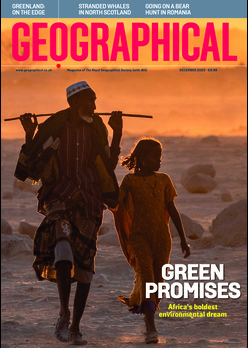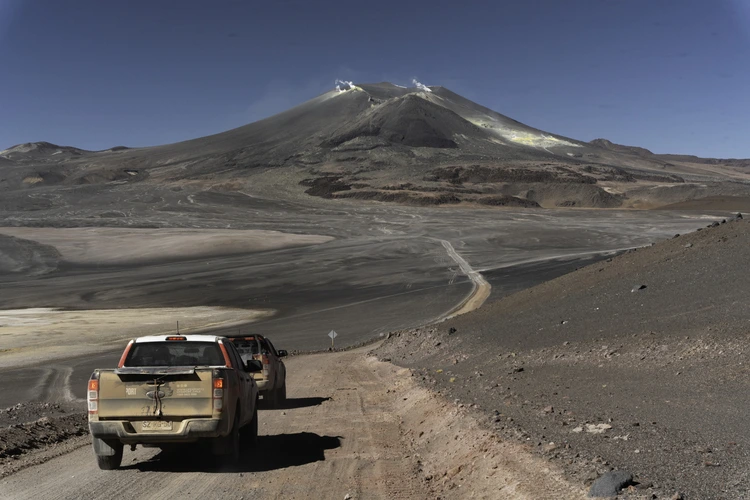
Using biofuels can make a significant difference in the emissions and environmental footprint of remote expeditions
By Alan Crofts
In April and May 2025, a team of experienced British explorers carried out the ‘Into Clean Air’ expedition to the Atacama Desert and high arid mountain passes in Chile and Bolivia. The expedition was organised to evaluate the premise that remote expeditions over challenging off-road terrain and environmental conditions can be carried out using a realistic carbon-mitigating strategy.
So, why did the team take on this project? Global exploratory expeditions using vehicles as primary transport often traverse environmentally sensitive geographic areas that are remote from support services such as refuelling and resupply opportunities.
Enjoying this article? Check out our related reads:
Primarily then, the team wanted to explore the possibility that a more carbon-mitigating and environmentally friendly fuel source could be used in the expedition vehicles as an alternative to diesel. Importantly, the team made no claim that the expedition was ‘carbon neutral’ – the expedition was designed as a practical demonstration using sustainable and carbon saving fuel sources to power the diesel vehicles and solar photo-voltaic mats to power the equipment.
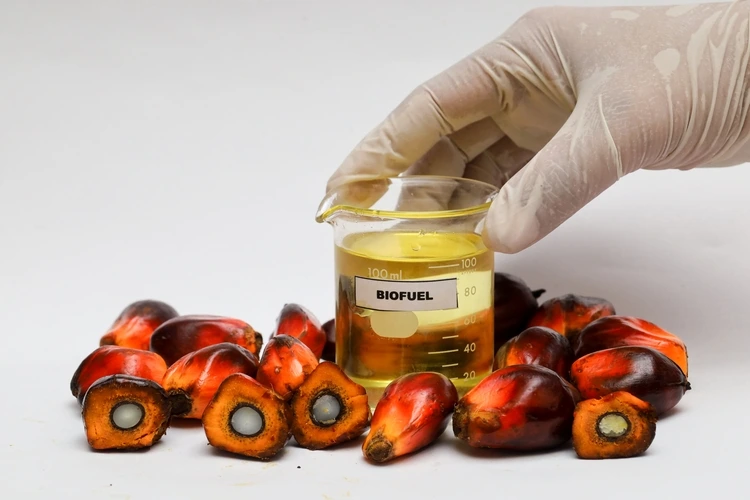
Initially, the idea was to use electric power – but there are severe practical limitations to using EV vehicles for remote expedition work: the obvious limitation is a lack of recharging opportunities but also there are very few commercially available EVs that are able to cope with severe off-road terrain.
It was decided therefore to use a biomass derived fuel substitute instead, but there were problems to consider and overcome including the lack of any commercially available biodiesel in Chile and the fact that exclusively using biomass-derived fuel often requires significant engine modifications to be undertaken. Also, it is important to consider that while biofuels are often touted as environmentally friendly, their production, depending on the source vegetation, can lead to significant environmental degradation. Large-scale biofuel production often necessitates extensive land clearing, which can result in deforestation, habitat loss, and biodiversity reduction.
The team worked through these issues and developed a viable plan. The essential element to accomplishing the primary objective was to source a viable and ethical biomass diesel substitute in Chile and Bolivia in sufficient quantity to fuel the vehicles.
The vehicles used in the expedition were two Ford Ranger 2.2L TDI Pickup trucks with electronic low-range gearing and differential lock options. These vehicles were chosen both for their ability to traverse difficult off-road desert and mountain terrain and their load carrying capability.
We then had to source sufficient biomass fuel in Chile and Bolivia – about 200L of biofuel for the 3,200 kilometre expedition. But where to source the fuel? In October 2024, the Environment and Climate Change officer at the British Embassy in Chile, put the expedition team in contact with a group that educates school children in sustainable energy. Led by Mr Rodolfo Rafa, this group collects waste cooking oil from Restaurants and School cafeterias in Santiago for processing into viable bio-diesel.
Mr Rafa kindly agreed to supply the processed waste cooking oil-derived bio-diesel required for the Chilean legs of the expedition. In actuality the expedition received enough processed oil to fuel the vehicles for the Bolivian as well as the Chilean leg of the expedition.
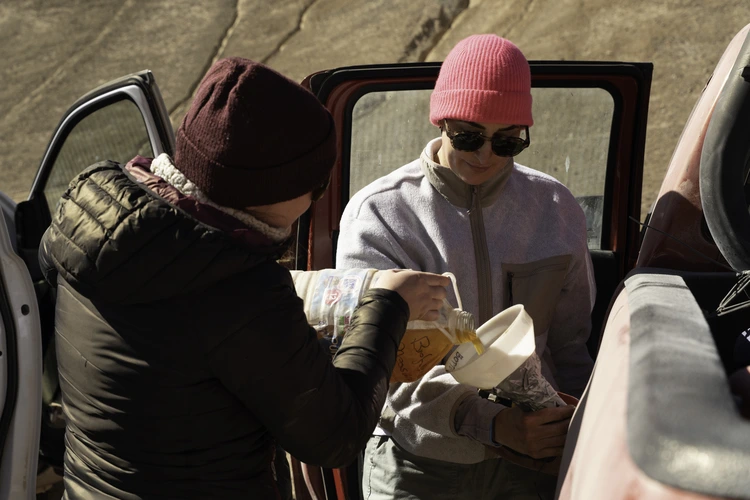
However, due to the interest shown in the expedition by the Bolivian Ministries of Industry and Tourism, we agreed to use a nationally-available 20 per-cent bio-diesel blend while in that country. Bolivia is actively increasing its biofuel production to reduce reliance on imported fossil fuels and promote a more sustainable energy matrix. To power the expedition equipment, flexible photo-voltaic panels were deployed over the flatbed area of both pick-up trucks so that power could be built up and stored in car batteries during daylight and whilst on the move. The panels were acquired through the kind support of BiPVCo, Newport.
The planning for the ‘Into Clean Air’ expedition began in January 2024 with a view to implementing the expedition in April and May 2025. The team consisted of Dr Alan Crofts (project coordinator and desert terrain specialist), Chris Beer (engineer and mechanic), Alex Keefe (expedition photographer and tactical navigation), Kathryn Cordiner (remote operations specialist) and Rebecca Marsh (travel reporter and remote campcraft specialist).
The expedition route was developed to best demonstrate the key objectives of the expedition: that remote expeditions can be ran using a practical carbon mitigating strategy. As this primarily translated into using a bio-fuel mix for the two vehicles the route had to include extremes of altitude, temperature and terrain.
Starting from Copiapo, Chile the first leg was to enter the high arid passes of the Cordilla Oriental subdivision of the Andes on the eastern border with Argentina and Bolivia. Here, the expedition progressed by following tracked routes laid down by exploratory mining operations or, where these did not exist, by frequently pathfinding novel routes through the passes by following a general bearing to a daily stop point. The route then entered Bolivia and, progressing north, crossed the Salar de Uyuni salt pan and the remote and semi-flooded Salar de Coipasa. Re-entering Chile, the route traversed the central Atacama Desert plain and returned south following the plain and entering the arid Cordillera de la Costa range before entering the sand dune system just north of Copiapo.
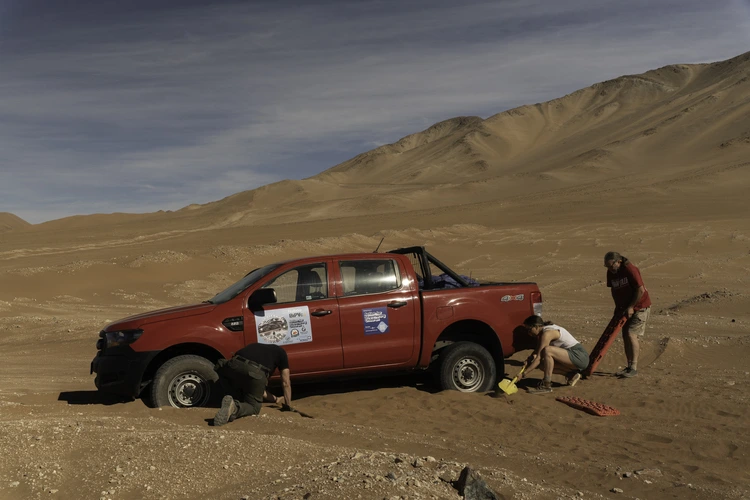
Overall, there was no discernible difference in engine performance between the control and active vehicles in all the environmental parameters we tested. In other words, we showed that unmodified diesel work vehicles and those used for remote expedition work can be run safely on waste cooking oil derived bio-fuel to the maximum allowed by the manufacturer’s warranty parameters.This finding could translate to a significant reduction in carbon emissions both in vehicles used in remote expedition and for those employed in industrial and mass-transit applications.
The expedition team would like to thank the following: Mr Rodolfo Rafa for collecting and processing the waste cooking oil, BiPVCo (Newport Wales) for supplying the Flextron solar mats, Dr Ria Bernard (CEO, Action for Stammering Children) her kind support and the British Embassy staff in Santiago and La Paz for support and country liaison.

